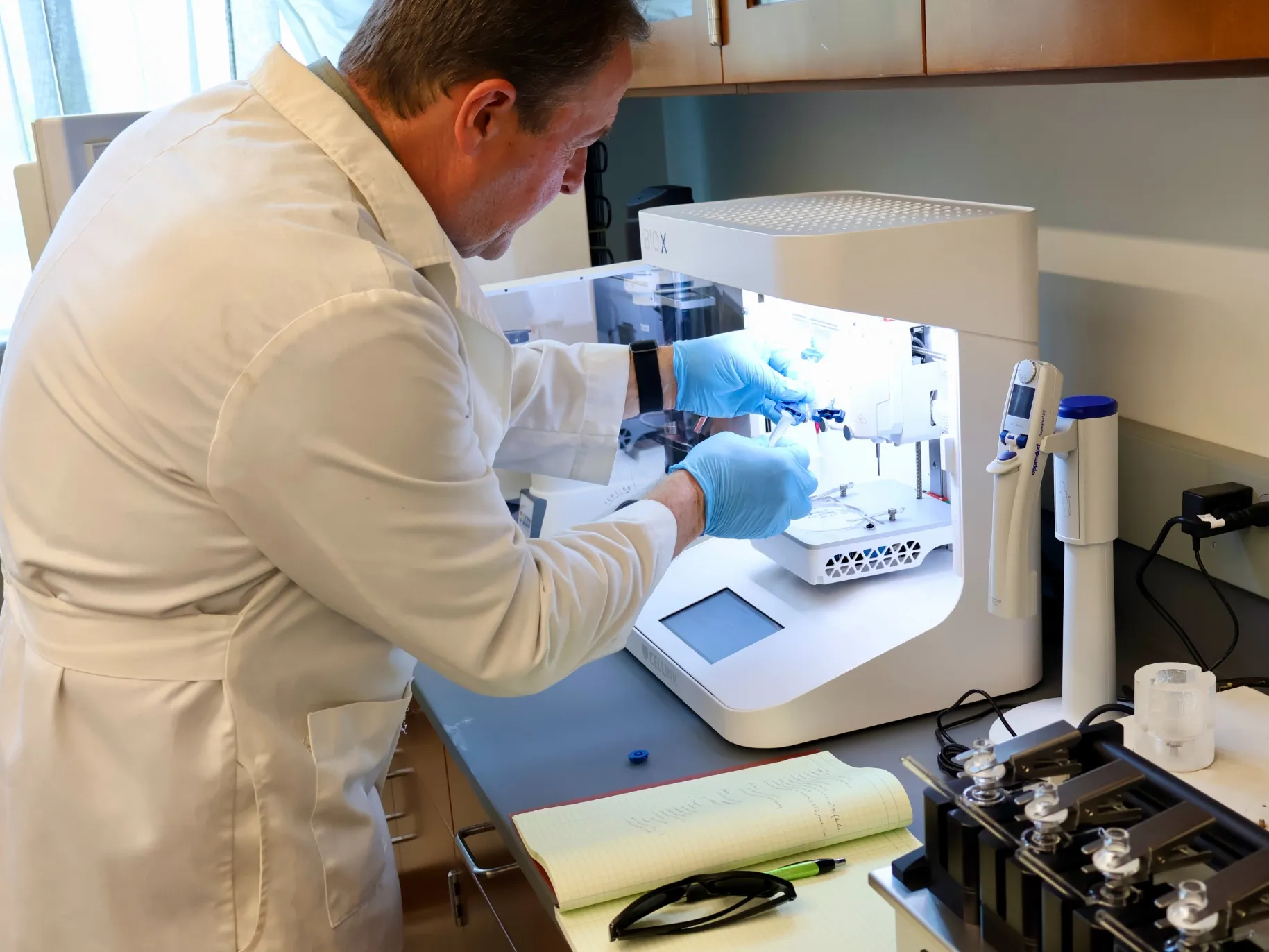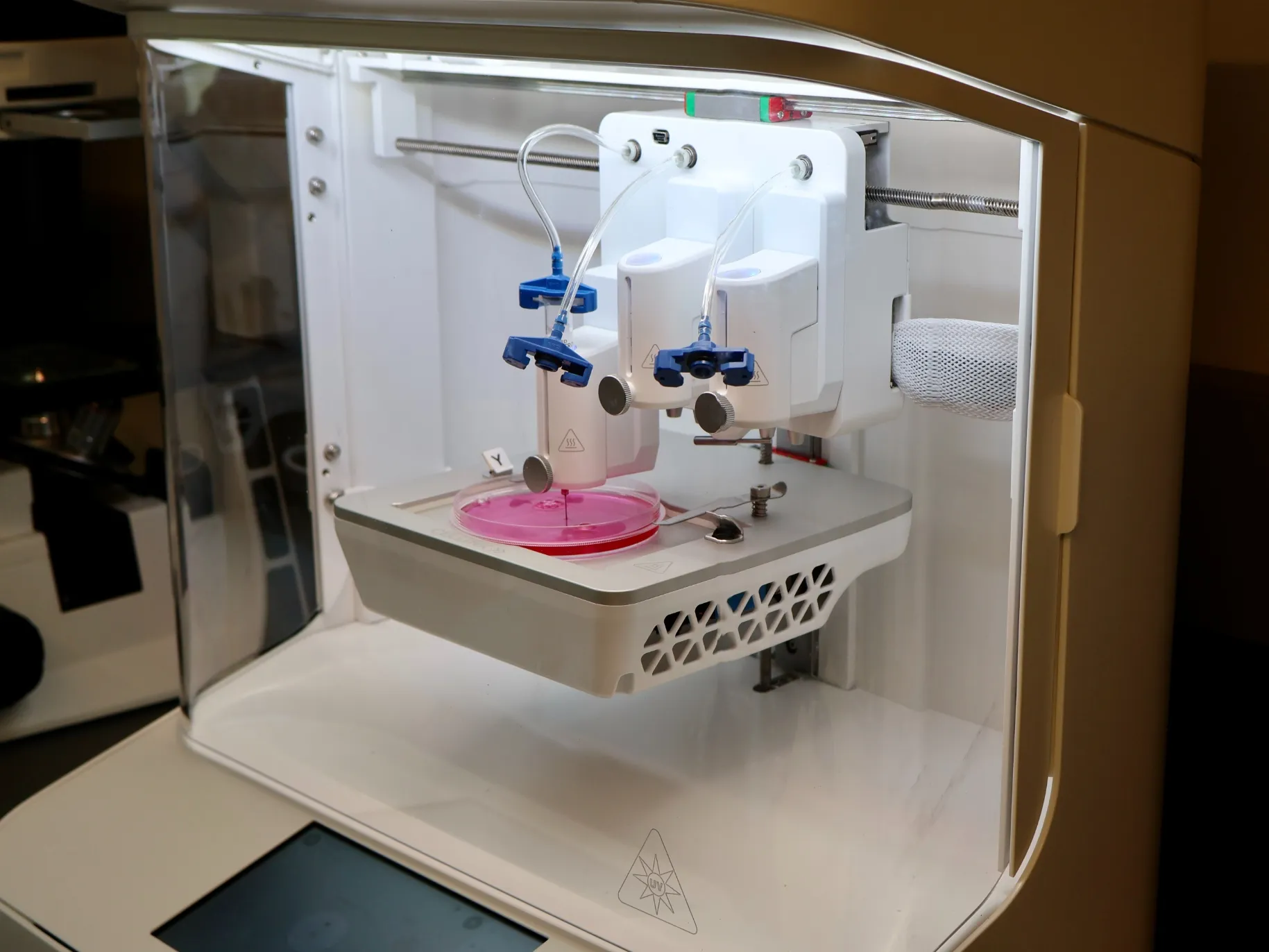- Home
- >
- APU Articles
- >
- News Article
New Tissue Engineering Facility Provides Cutting-Edge Opportunities
June 27, 2024 | Category Provost, Humanities and Sciences | Written By Jacqueline Guerrero

In June 2023, Azusa Pacific University received funds to build a state-of-the-art tissue engineering research facility in the Segerstrom Science Center. This lab enables students to do research to set them up for success in the rapidly growing field of pharma and biopharma product development. “APU is the only Christian university on the West Coast with a facility like this,” said David Dyer, PhD, director of the Master of Science in Biotechnology program. “Last semester we got the lab up and running, and this spring we are moving ahead with research on systems for high-throughput toxicology screening. This type of work relates both to pharmaceutics development and environmental toxicology.”
Biotechnology is the process of using living cells to create therapeutic products. While the lab incorporates in-depth training into students' learning experiences, it is mainly a research facility. “This facility will advance research and innovation at APU,” Dyer said. “The laboratory will allow students significant opportunities to obtain training in this important and growing area of biomedical research.”
Established in 2016, the MS Biotechnology program trains students in all of the aspects of biopharmaceutical product development that are critical for a successful career in the biomedical product industry sector. The MS Biotechnology program’s unique structure includes alliances between APU and major biomedical product companies such as Gilead Sciences, Grifols Biologicals, and Amgen. “Students in the MS Biotechnology program are placed at these companies to complete master’s capstone projects. This deepens their applied expertise and provides them direct experience in biopharma company culture while expanding their professional networks,” Dyer says. This style of training improves accurate communication between the many groups that work together to bring advanced medical products to patients. The curriculum also trains students in Christian-worldview based decision making and ethics. “I was looking for practical experience because I didn’t feel industry-ready,” said Samkele Mtonga, a first year student in the Master of Science in Biotechnology program. “The new lab has given me the practical skills that I felt I needed to succeed in the workforce.”
The main focus of the lab is high-speed toxicological screening. This relates both to new drug candidate screening and to the broader area of environmental toxicology. The initial goal is to be able to quickly identify toxins that may damage liver cells. The long term objective of the lab is to provide tissue-specific “organoid” systems that can reduce or eliminate the use of animals in toxicology screening, while still providing important human-specific information to guide early drug development processes. Organoids are groups of cells that are assembled to represent the three dimensional structures found in real organs. “Usually cells are plated on a flat surface and grow in a single layer, but we’re trying to grow them into three-dimensional shapes that better represent how cells will react in three-dimensional tissue,” Dyer said. The new lab allows students to apply the newest concepts and information in this quickly-developing area of research. “Learning about what Charles Darwin did hundreds of years ago will only get you so far. We need to know what discoveries have recently been made because that will give us a better approach,” Mtonga said.
Students' research is supported by vital pieces of equipment including a state of the art imaging system, nucleic acid sequencers, a polymerase chain reaction (PCR) workstation and other essential analytical chemistry equipment. However, the most exciting piece of equipment in the new lab is the 3D tissue printer. “Computer-assisted 3D printers have been around for a while, but instead of printing plastic forms and shapes, we use living cells and other biomaterials to create tissues and model artificial organs,” Dyer said. Student researchers can then study how cells work with each other inside these tissue models instead of having to rely on organs from animal sources. “While it’s still in its early stages, the potential applications of the printer make it one of the most powerful pieces of technology in the lab,” Mtonga said.

Through the program, Mtonga learned the importance of ethics and morality through faith integration in science. “It’s key to integrate faith into the industry. Being guided by the Bible helps us to make decisions that are for the good of people,” Mtonga said. “If you have Christ who says love your neighbor and you’ve got that love for people, you will make correct decisions for the good of people.”
Dyer’s long term goals for the lab include expanding university-based collaboration and providing contract testing for major biopharma companies in Southern California.